Unit 1 Teenage life Reading for writing课件(新人教版必修一)
文档属性
| 名称 | Unit 1 Teenage life Reading for writing课件(新人教版必修一) |  | |
| 格式 | pptx | ||
| 文件大小 | 3.7MB | ||
| 资源类型 | 试卷 | ||
| 版本资源 | 人教版(2019) | ||
| 科目 | 英语 | ||
| 更新时间 | 2023-09-14 13:42:31 | ||
图片预览

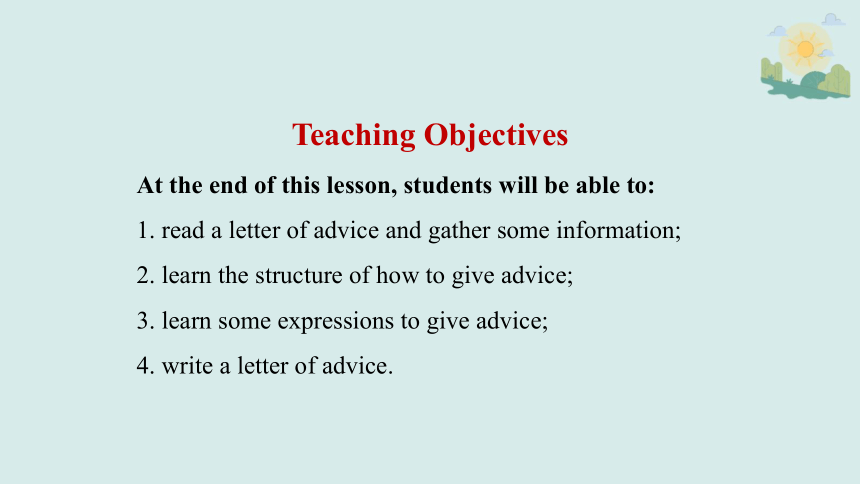
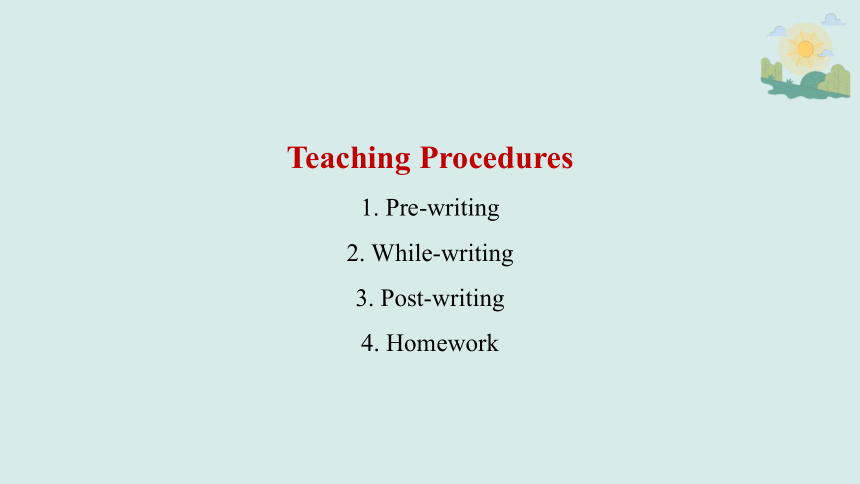
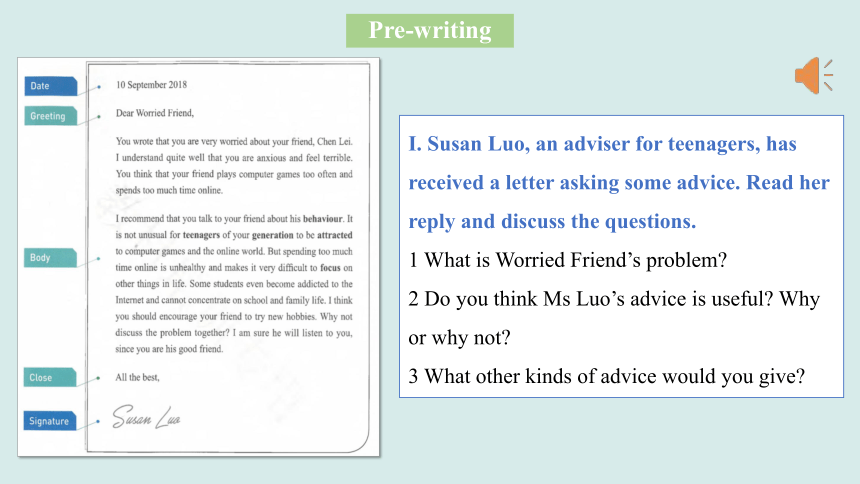
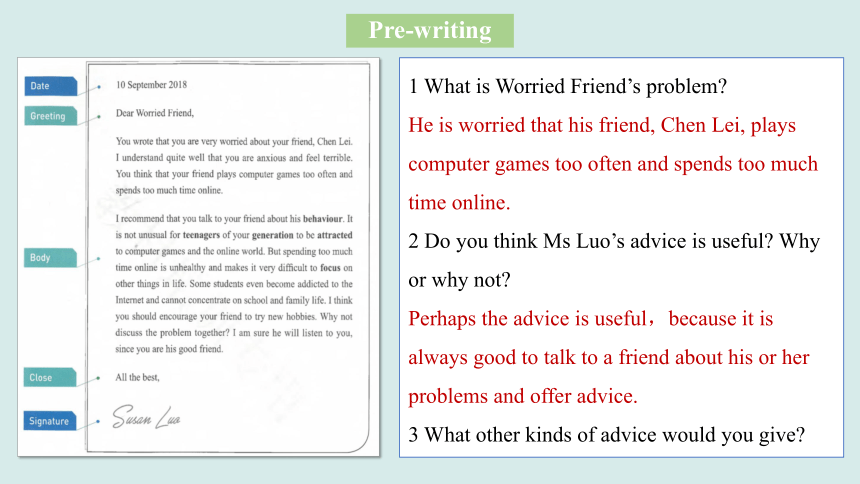
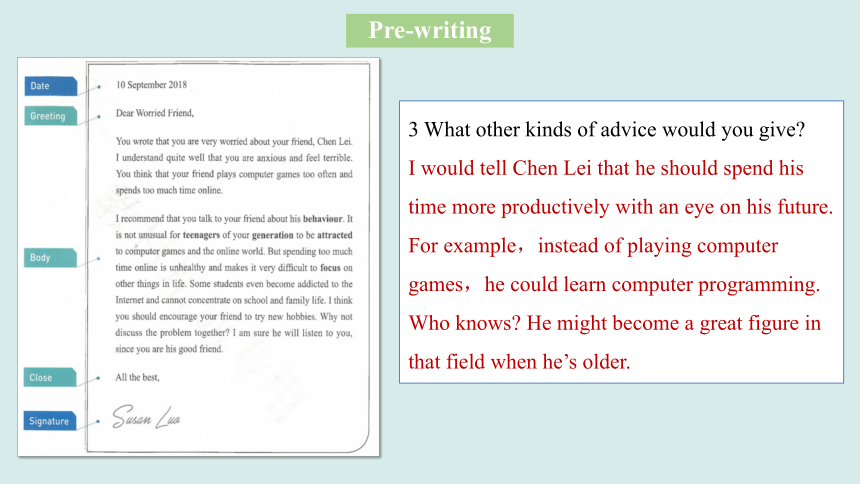
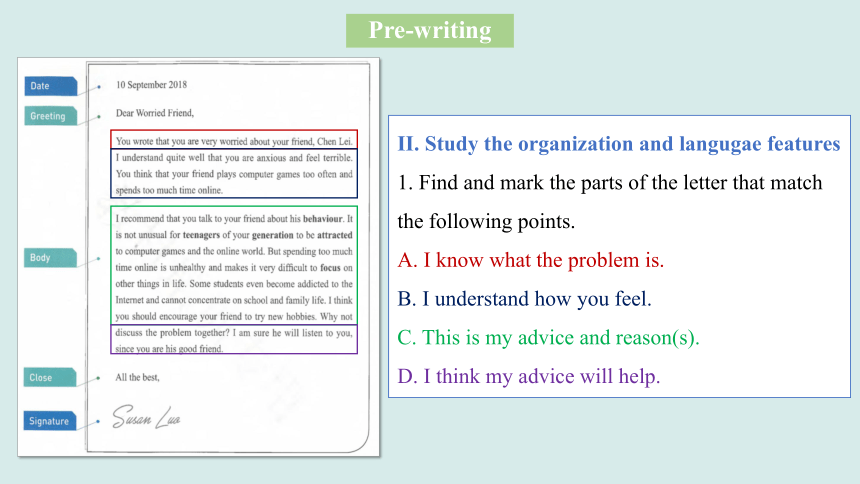
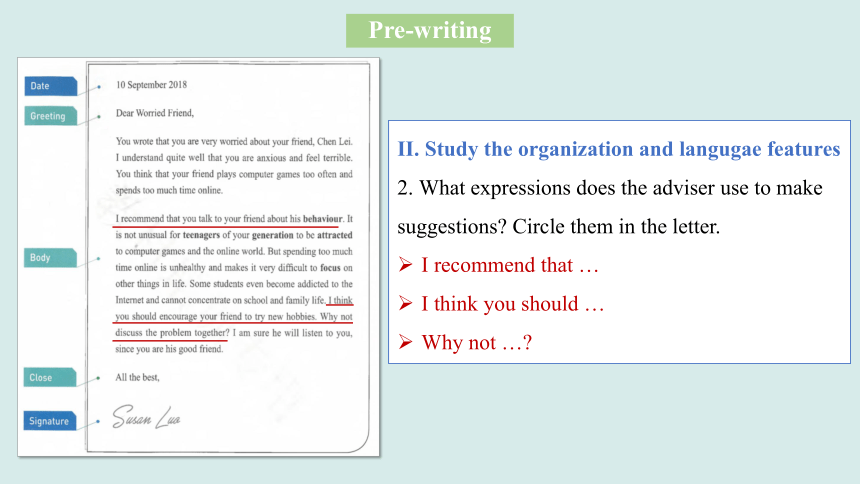
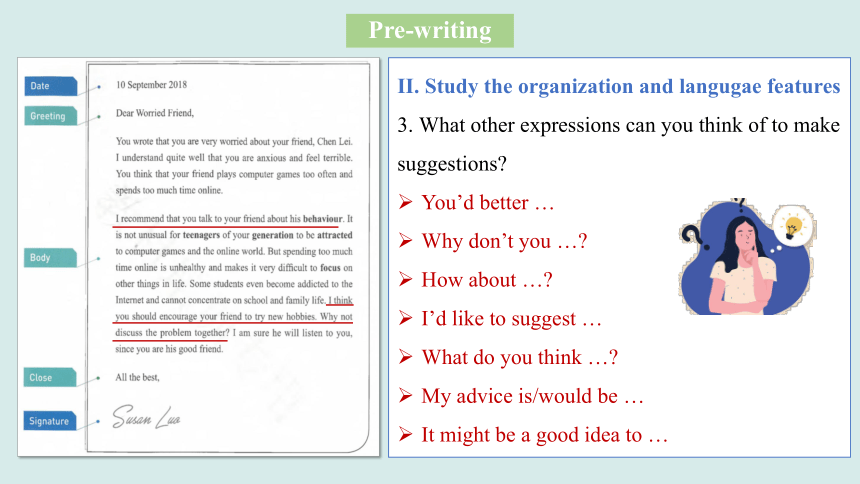
文档简介
(共23张PPT)
Teaching Objectives
At the end of this lesson, students will be able to:
1. read a letter of advice and gather some information;
2. learn the structure of how to give advice;
3. learn some expressions to give advice;
4. write a letter of advice.
Teaching Procedures
1. Pre-writing
2. While-writing
3. Post-writing
4. Homework
I. Susan Luo, an adviser for teenagers, has received a letter asking some advice. Read her reply and discuss the questions.
1 What is Worried Friend’s problem
2 Do you think Ms Luo’s advice is useful Why or why not
3 What other kinds of advice would you give
Pre-writing
1 What is Worried Friend’s problem
He is worried that his friend, Chen Lei, plays computer games too often and spends too much time online.
2 Do you think Ms Luo’s advice is useful Why or why not
Perhaps the advice is useful,because it is always good to talk to a friend about his or her problems and offer advice.
3 What other kinds of advice would you give
Pre-writing
3 What other kinds of advice would you give
I would tell Chen Lei that he should spend his time more productively with an eye on his future. For example,instead of playing computer games,he could learn computer programming. Who knows He might become a great figure in that field when he’s older.
Pre-writing
II. Study the organization and langugae features
1. Find and mark the parts of the letter that match the following points.
A. I know what the problem is.
B. I understand how you feel.
C. This is my advice and reason(s).
D. I think my advice will help.
Pre-writing
II. Study the organization and langugae features
2. What expressions does the adviser use to make suggestions Circle them in the letter.
I recommend that …
I think you should …
Why not …
Pre-writing
II. Study the organization and langugae features
3. What other expressions can you think of to make suggestions
You’d better …
Why don’t you …
How about …
I’d like to suggest …
What do you think …
My advice is/would be …
It might be a good idea to …
Pre-writing
While-writing
1. Use what you have learnt to write a letter of advice to one of the teenagers below.
1 Work in groups. Choose one of the teenagers and discuss his/her problem. List possible suggestions and reasons.
While-writing
1. Use what you have learnt to write a letter of advice to one of the teenagers below.
1 Work in groups. Choose one of the teenagers and discuss his/her problem. List possible suggestions and reasons.
Name Suggestion Reason
Eric
Try listening to your parents.
Invite them out for something to eat.
Maybe they aren’t listening to you because you don’t listen to them.
This will give you a chance to speak to them without distractions.
While-writing
1. Use what you have learnt to write a letter of advice to one of the teenagers below.
1 Work in groups. Choose one of the teenagers and discuss his/her problem. List possible suggestions and reasons.
Name Suggestion Reason
Xu
Ting
Join a volunteer
group.
This will give you a chance to be around other people, and help you realize that other people have problems, too.
While-writing
1. Use what you have learnt to write a letter of advice to one of the teenagers below.
1 Work in groups. Choose one of the teenagers and discuss his/her problem. List possible suggestions and reasons.
Name Suggestion Reason
Xu
Ting
Connect with your
parents online.
Just because they are far away, it doesn’t mean that you can’t talk to them.
While-writing
1. Use what you have learnt to write a letter of advice to one of the teenagers below.
1 Work in groups. Choose one of the teenagers and discuss his/her problem. List possible suggestions and reasons.
Name Suggestion Reason
Min
Ho
Ask a mutual
friend to introduce you to her.
Your friend will be able to break the ice with her and provide encouragement
to you.
While-writing
1. Use what you have learnt to write a letter of advice to one of the teenagers below.
1 Work in groups. Choose one of the teenagers and discuss his/her problem. List possible suggestions and reasons.
Name Suggestion Reason
Min
Ho
Find chances to get together in groups where she is a group member.
If you are in a group, it takes all the pressure off, and you can interact with
her in a relaxing setting.
While-writing
2. Draft your letter according to the outline below.
_________________
Dear __________,
You wrote that ____________________________.
I understand that___________________________.
I think ___________________________________
because ___________________________. I am sure
that ________________________________________.
Best wishes,
______________
15 September 2020
Dear Eric,
You wrote that your parents won't listen when you tell them things. I understand quite well that you are a little disappointed and upset and feel terrible. You think that your parents can't understand you.
I recommend that you talk to your parents about your feelings and your expectations. When you want to tell them something, try to do it in a respectful way. Although it is commonly seen that there is a generation gap betwwen parents and teenagers, sharing ideas among family members is very important. I think you should tell them you are old enough to do something or make a decision on your own. I am sure they will listen to you, since they are your parents and what they do is to do good to you.
All the best,
Susan Luo
15 September 2020
Dear Xu Ting,
You wrote that you don't live with your parents becuase they work in another city. I understand quite well that you are quite lonely and feel terrible. You think that without your parents living with you makes you lonely.
I recommend that you make new friends. A good friend knows you well and provides necessary help when you are in trouble. If you have some friends, you can spend time with them after school to relieve your loneliness. At the same time I recommend you be more independent. As time goes by, your parents or friends will leave you one by one, which is very natural. If you feel lonely and have no one to talk with, try to do something you like to make you feel better. I hope my suggestion will help.
All the best,
Susan Luo
15 September 2020
Dear Min Hao,
You wrote that you....
I recommend that you.....I hope my suggestion will help.
All the best,
Susan Luo
While-writing
Post-writing
3. Exchange drafts. Use the checklist to give feedback on your partner’s draft.
√ Are all the parts of a letter included and organized in a good order
√ Does the writer give reasons for the advice
√ Does the writer use proper expressions to give suggestions
√ Does the writer use commas and stops correctly
√ Is the handwriting easy to read
1. Revise your letter and read it to one of your classmates.
2. Read the four cases of “Talking Teens” on Page 75 of the Workbook, choose one case and write a letter of advice to the parent.
Homework
Teaching Objectives
At the end of this lesson, students will be able to:
1. read a letter of advice and gather some information;
2. learn the structure of how to give advice;
3. learn some expressions to give advice;
4. write a letter of advice.
Teaching Procedures
1. Pre-writing
2. While-writing
3. Post-writing
4. Homework
I. Susan Luo, an adviser for teenagers, has received a letter asking some advice. Read her reply and discuss the questions.
1 What is Worried Friend’s problem
2 Do you think Ms Luo’s advice is useful Why or why not
3 What other kinds of advice would you give
Pre-writing
1 What is Worried Friend’s problem
He is worried that his friend, Chen Lei, plays computer games too often and spends too much time online.
2 Do you think Ms Luo’s advice is useful Why or why not
Perhaps the advice is useful,because it is always good to talk to a friend about his or her problems and offer advice.
3 What other kinds of advice would you give
Pre-writing
3 What other kinds of advice would you give
I would tell Chen Lei that he should spend his time more productively with an eye on his future. For example,instead of playing computer games,he could learn computer programming. Who knows He might become a great figure in that field when he’s older.
Pre-writing
II. Study the organization and langugae features
1. Find and mark the parts of the letter that match the following points.
A. I know what the problem is.
B. I understand how you feel.
C. This is my advice and reason(s).
D. I think my advice will help.
Pre-writing
II. Study the organization and langugae features
2. What expressions does the adviser use to make suggestions Circle them in the letter.
I recommend that …
I think you should …
Why not …
Pre-writing
II. Study the organization and langugae features
3. What other expressions can you think of to make suggestions
You’d better …
Why don’t you …
How about …
I’d like to suggest …
What do you think …
My advice is/would be …
It might be a good idea to …
Pre-writing
While-writing
1. Use what you have learnt to write a letter of advice to one of the teenagers below.
1 Work in groups. Choose one of the teenagers and discuss his/her problem. List possible suggestions and reasons.
While-writing
1. Use what you have learnt to write a letter of advice to one of the teenagers below.
1 Work in groups. Choose one of the teenagers and discuss his/her problem. List possible suggestions and reasons.
Name Suggestion Reason
Eric
Try listening to your parents.
Invite them out for something to eat.
Maybe they aren’t listening to you because you don’t listen to them.
This will give you a chance to speak to them without distractions.
While-writing
1. Use what you have learnt to write a letter of advice to one of the teenagers below.
1 Work in groups. Choose one of the teenagers and discuss his/her problem. List possible suggestions and reasons.
Name Suggestion Reason
Xu
Ting
Join a volunteer
group.
This will give you a chance to be around other people, and help you realize that other people have problems, too.
While-writing
1. Use what you have learnt to write a letter of advice to one of the teenagers below.
1 Work in groups. Choose one of the teenagers and discuss his/her problem. List possible suggestions and reasons.
Name Suggestion Reason
Xu
Ting
Connect with your
parents online.
Just because they are far away, it doesn’t mean that you can’t talk to them.
While-writing
1. Use what you have learnt to write a letter of advice to one of the teenagers below.
1 Work in groups. Choose one of the teenagers and discuss his/her problem. List possible suggestions and reasons.
Name Suggestion Reason
Min
Ho
Ask a mutual
friend to introduce you to her.
Your friend will be able to break the ice with her and provide encouragement
to you.
While-writing
1. Use what you have learnt to write a letter of advice to one of the teenagers below.
1 Work in groups. Choose one of the teenagers and discuss his/her problem. List possible suggestions and reasons.
Name Suggestion Reason
Min
Ho
Find chances to get together in groups where she is a group member.
If you are in a group, it takes all the pressure off, and you can interact with
her in a relaxing setting.
While-writing
2. Draft your letter according to the outline below.
_________________
Dear __________,
You wrote that ____________________________.
I understand that___________________________.
I think ___________________________________
because ___________________________. I am sure
that ________________________________________.
Best wishes,
______________
15 September 2020
Dear Eric,
You wrote that your parents won't listen when you tell them things. I understand quite well that you are a little disappointed and upset and feel terrible. You think that your parents can't understand you.
I recommend that you talk to your parents about your feelings and your expectations. When you want to tell them something, try to do it in a respectful way. Although it is commonly seen that there is a generation gap betwwen parents and teenagers, sharing ideas among family members is very important. I think you should tell them you are old enough to do something or make a decision on your own. I am sure they will listen to you, since they are your parents and what they do is to do good to you.
All the best,
Susan Luo
15 September 2020
Dear Xu Ting,
You wrote that you don't live with your parents becuase they work in another city. I understand quite well that you are quite lonely and feel terrible. You think that without your parents living with you makes you lonely.
I recommend that you make new friends. A good friend knows you well and provides necessary help when you are in trouble. If you have some friends, you can spend time with them after school to relieve your loneliness. At the same time I recommend you be more independent. As time goes by, your parents or friends will leave you one by one, which is very natural. If you feel lonely and have no one to talk with, try to do something you like to make you feel better. I hope my suggestion will help.
All the best,
Susan Luo
15 September 2020
Dear Min Hao,
You wrote that you....
I recommend that you.....I hope my suggestion will help.
All the best,
Susan Luo
While-writing
Post-writing
3. Exchange drafts. Use the checklist to give feedback on your partner’s draft.
√ Are all the parts of a letter included and organized in a good order
√ Does the writer give reasons for the advice
√ Does the writer use proper expressions to give suggestions
√ Does the writer use commas and stops correctly
√ Is the handwriting easy to read
1. Revise your letter and read it to one of your classmates.
2. Read the four cases of “Talking Teens” on Page 75 of the Workbook, choose one case and write a letter of advice to the parent.
Homework
